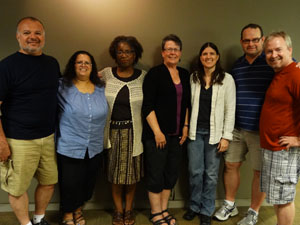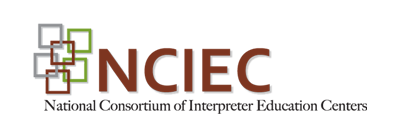Deaf Interpreter
A Deaf Interpreter is a specialist who provides interpreting, translation, and transliteration services in American Sign Language and other visual and tactual communication forms used by individuals who are Deaf, hard-of-hearing, and Deaf-Blind. As a Deaf person, the Deaf Interpreter starts with a distinct set of formative linguistic, cultural, and life experiences that enables nuanced comprehension and interaction in a wide range of visual language and communication forms influenced by region, culture, age, literacy, education, class, and physical, cognitive, and mental health. These experiences coupled with professional training give the Deaf interpreter the ability to successfully communicate across all types of interpreted interactions, both routine and high risk. NCIEC studies indicate that in many situations, use of a Deaf Interpreter enables a level of linguistic and cultural bridging that is often not possible when hearing ASL-English interpreters work alone.
Currently, Deaf Interpreters work most often in tandem with hearing interpreters. The Deaf-Hearing interpreter team ensures that the spoken language message reaches the Deaf consumer in a language or communication form that he or she can understand, and that the Deaf consumer’s message is conveyed successfully in the spoken language.
National Consortium’s Work on Deaf Interpreter Practice
During the 2005 – 2010 grant cycle the Consortium’s Deaf Interpreter work team delineated the unique competencies required of Deaf interpreters in a document titled Toward Effective Practice: Competencies of the Deaf Interpreter (available at www.DIInstitute.org). The Consortium gratefully acknowledges the hard work and invaluable contributions of the 2005-2010 work team: Jimmy Beldon, Patrick Boudreault, Steven Collins, Eileen Forestal, Carole Lazorisak, Priscilla Moyers, Cynthia Napier, and Debbie Peterson. NCIEC Center staff included Cathy Cogen (lead), NURIEC; and Lillian Garcia Peterkin (NIEC).
 Now, co-led by the Regional Interpreter Education Center at Northeastern University (NURIEC) and the National Interpreter Education Center (NIEC) with support of all of the Consortium Centers, the 2010-2015 DI team developed and field-tested a competency-based curriculum in the context of an existing DI training series, the Road to Deaf Interpreting (RDI). RDI is based in Massachusetts and serves a regional and national audience since 2008.
Now, co-led by the Regional Interpreter Education Center at Northeastern University (NURIEC) and the National Interpreter Education Center (NIEC) with support of all of the Consortium Centers, the 2010-2015 DI team developed and field-tested a competency-based curriculum in the context of an existing DI training series, the Road to Deaf Interpreting (RDI). RDI is based in Massachusetts and serves a regional and national audience since 2008.
 An expert team of six Deaf interpreter practitioners and educators collaborated with curriculum specialists to establish the intended scope and outcomes of the curriculum, to create developmentally-structured student learning experiences, and to determine assessment strategies to measure student achievement of intended outcomes. The team piloted the curriculum over a one-year period. In June 2014, NCIEC held a train-the-trainer session, orienting 12 new DI trainers to the curriculum.
An expert team of six Deaf interpreter practitioners and educators collaborated with curriculum specialists to establish the intended scope and outcomes of the curriculum, to create developmentally-structured student learning experiences, and to determine assessment strategies to measure student achievement of intended outcomes. The team piloted the curriculum over a one-year period. In June 2014, NCIEC held a train-the-trainer session, orienting 12 new DI trainers to the curriculum.
Now, after many years of hard work and collaboration, we are pleased to announce that the Deaf Interpreter Curriculum is finally here! To view individual sections of the curriculum or download it in its entirety, please click on the link in “Resources” below.
The National Consortium is grateful for the partnership of Deaf interpreter experts in the development of the curricular modules, Jimmy Beldon, Stephanie Clark, Eileen Forestal, Jim Lipsky, and Cynthia Napier; curriculum design specialists Dr. Rico Peterson and Dr. Chris Kurz; and our technical team: Nancy Bloch, consultant, Touchpont Group; Doug Bowen-Bailey, videographer; Nancy Creighton, creative designer, Purple Swirl Arts; and Cynthia Napier, NCIEC Deaf interpreter team member and liaison.
NCIEC representative: Lillian Garcia Peterkin, National Center Communication and Outreach Coordinator serves on the team.
For detailed information, publications, and other resources associated with this project, please visit DIInstitute.org.
Resources
NCIEC Deaf Interpreter Work Team (2014). Deaf Interpreter Curriculum. National Consortium of Interpreter Education Centers.
Based on the unique competencies required of the Deaf interpreter, the curriculum is designed for use in interpreting education programs and community-based forums. The NCIEC Deaf Interpreter Curriculum consists of six modules arranged in sequential order. Appendices include the Deaf interpreter competencies, worksheets, presentation slides, a glossary, and a comprehensive listing of resources.
NCIEC Deaf Interpreter Work Team (2009). Analysis of Deaf Interpreter focus group discussions conducted April-July 2007. National Consortium of Interpreter Education Centers.
This report presents the findings of six focus groups conducted by the NCIEC Deaf Interpreter Work Team to gather the perspectives of certified and non-certified working Deaf Interpreters from across the United States on current issues and future directions in the field of Deaf Interpreting. Several themes emerged from the analysis of the discussions: Formative Experiences of Deaf Interpreters, Professional Standards and Expectations, Formal Preparation of Deaf Interpreters, and Employment Issues. The report synthesizes the focus group discussions around these themes and recommends areas for further study and future action.
NCIEC Deaf Interpreter Work Team (2009). Findings of Deaf Interpreter Educator Focus Groups Conducted December 2007. National Consortium of Interpreter Education Centers.
This report contains the findings of a research project undertaken by the National Consortium of Interpreter Education Centers (NCIEC) Deaf Interpreter Work Team in December 2007. The scope of the project was to invite a group of Deaf Interpreter Educators to respond to an on-line survey and to participate in a focus group about some of the issues related to Deaf Interpreting. In total, twelve Deaf interpreting educators participated in the process. The research is but one of the many activities undertaken by the Deaf Interpreter Initiative of the NCIEC to engage processes that would provide current evidence about Deaf interpreting practice in the United States.
NCIEC Deaf Interpreter Work Team (2009). Findings of a national survey of Deaf Interpreters conducted spring 2007. National Consortium of Interpreter Education Centers.
An analysis of data collected through an online national survey of certified and non-certified Deaf Interpreters during the spring of 2007. The report offers an analysis of demographics, work environments, consumers, language demands, and professional development needs and aspirations. A profile of the Deaf Interpreter is offered based on the findings and recommendations are made for further study and action.
NCIEC Deaf Interpreter Work Team (2010). Toward Effective Practice: Competencies of the Deaf Interpreter. National Consortium of Interpreter Education Centers.
This document delineates the competencies required of the Deaf Interpreter based upon studies conducted by the National Consortium of Interpreter Education Centers (NCIEC). The delineation refers broadly to generic and specialty area competencies required of all interpreters, and then delves more deeply into the unique aptitudes, formative experiences, and competencies that differentiate Deaf Interpreters from their hearing counterparts.
NCIEC DI Work-Team (2009). NCIEC Deaf Interpreting work-team to present at the RID Deaf caucus meeting. RID VIEWS, 26 (3), 43.
Article gives notice of an upcoming presentation by the NCIEC DI Work-Team on findings of the team’s focus group and survey studies, progress of the newly established CDI Task Force, and the launch of a new website, Deaf Interpreting Institute.
NCIEC DI Work-Team (2009). News from the NCIEC DI Interpreting Work Team: Deaf Interpreting Institute, Proposed Domains and Competencies and CDI Task Force. RID VIEWS, 26 (4), 43.
NCIEC Deaf Interpreting Work Team talks about the Deaf Interpreting Institute, proposed domains and competencies and the contributions of the CDI Task Force.
